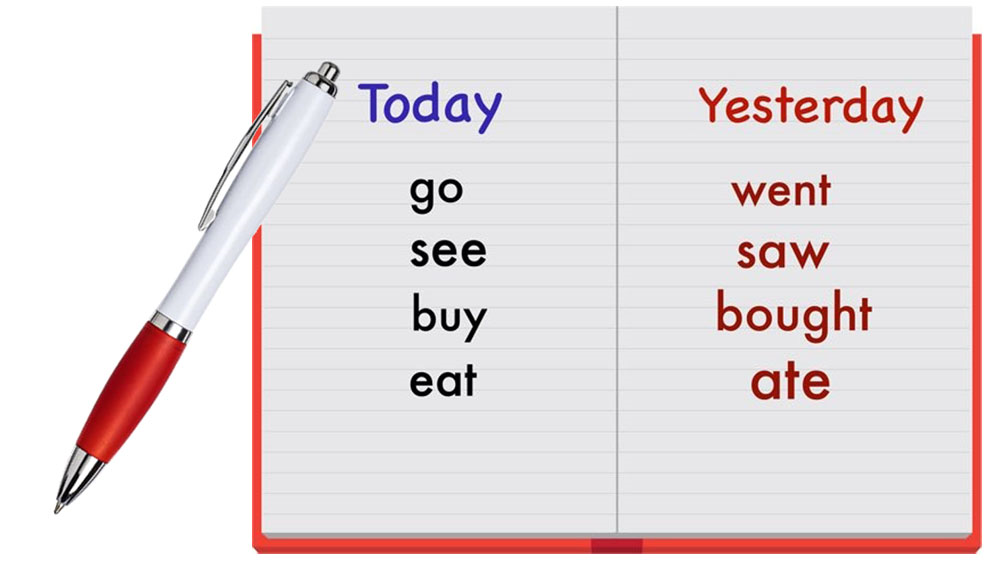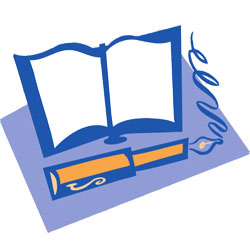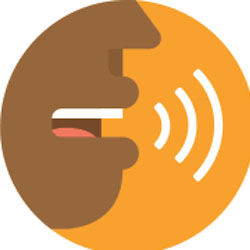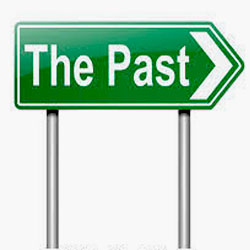فعل زمان گذشته ساده انگلیسی Simple English past tense verb برای صحبت کردن در مورد یک عمل کامل شده در زمان گذشته استفاده میشود. گذشته ساده شکل اصلی فعل زمان گذشته در انگلیسی است. زمان عمل انجام شده میتواند در گذشته نزدیک یا گذشته دور واقع شده باشد. به هر حال, مدت زمان عمل اهمیت ندارد.
جهت آشنایی و بررسی بهترین آموزشگاه زبان در کرج اینجا کلیک کنید.

نویسنده: American-English File
مترجم: رویا کریمی جنابی
گذشته ساده افعال tobe : was /were
President Reagan’s wife was an actress.
She wasn’t in class yesterday. Was she sick?
The Beatles were famous in the 1960’s.
Where were you last night? You weren’t at home.
• برای صحبت در مورد گذشته از was/were استفاده می کنیم.
• اغلب was/were را با عبارات بیان کننده ی زمان مثل .yesterday, last night, in 1945, etc به کار می بریم.
• با born از was/were استفاده می کنیم.
| - |
+ |
| wasn’t there. |
I/ he/ she/ it |
was there. |
I/ he/ she/ it |
| weren’t there. |
You/ we/ they |
were there. |
You/ we/ they |
| - |
+ |
? |
| No, I wasn't. |
Yes, I was. |
famous? |
I/ he/ she/ it |
Was |
|
No I weren't.
|
Yes, you were. |
famous? |
You/ we/ they |
Were |
گذشته ساده افعال با قاعده (regular verbs)
I played tennis this morning.
We watched a good movie on TV last night.
My grandfather lived in Sao Paulo when he was young.
I studied Korean when I was at school.
• برای بیان کارهایی که در گذشته انجام شده است از زمان گذشته ساده استفاده می کنیم.
قوانین نگارش برای افعال با قاعده
| spelling |
past |
Base form |
| add -ed |
Watched
played |
Watch
play |
| add -d |
lived |
live |
One- syllable verbs:
one vowel+ one consonant=
double consonant |
stopped |
stop |
| Consonant+ y > ied |
studied |
study |
| - |
+ |
|
didn't work yesterday.
|
I/ you/ |
worked yesterday. |
I/ you/ |
| He/ she/ it/ |
He/ she/ it/ |
| We/ they/ |
We/ they/ |
| - |
+ |
? |
|
.didn't
|
I |
No,
|
did.
|
I |
Yes,
|
work yesterday?
|
I |
Did
|
| you |
you |
you |
| he |
he |
he |
| she |
she |
she |
| it |
it |
it |
| we |
we |
we |
| they |
they |
they |
• didn't شکل مختصر شده did not است.
• در زمان گذشته ساده، آخر افعال با قاعده ed قرار می گیرد:
worked, lived, played.
• شکل زمان گذشته برای تمام اشخاص (.I, you, she,etc) یکسان است.
• برای سوالی و منفی کردن گذشته ساده از افعال کمکی did/ didn't و فعل اصلی استفاده می کنیم. Did گذشتهی do است.
گذشته ساده افعال بی قاعده (irregular verbs)
I went to Canada last night.
I didn't go to Toronto.
Did you go to Montreal?
I went to Canada last night.
I didn't go to Toronto.
Did you go to Montreal?
| Past(-) |
Past(+) |
Base form |
didn't go
didn't have
didn't get
didn't teach
didn't hear
didn't feel
didn't leave
didn't lose
didn't meet
didn't see
didn't wear
didn't speak
didn't do |
went
had
got
taught
heard
felt
left
lost
met
saw
wore
spoke
did |
go
have
get
teach
hear
feel
leave
lose
meet
see
wear
speak
do |
• از گذشته فعل بی قاعده فقط در جملات مثبت استفاده کنید:
I saw a movie last night.
• بعد از did/ didn't از شکل اصلی فعل استفاده می کنیم:
Did you see a movie last night? NOT did you saw…?
I didn't go out last night. NOT I didn't went….
• به یاد داشته باشید که ترتیب کلمات در جملات سوالی به این صورت است:
Auxiliary, subject, base form: Did you go out last night? OR
Question word, auxiliary, subject, base form: Where did you go?
Could
Past of can= could
(-)= couldn't NOT didn't can
(?)= could you…? NOT did you can…?
( regular and irregular ) افعال باقاعده و بی قاعده
1. be
- (+) I was born in Japan.
They were late for class yesterday.
- (-) she wasn't at home last night.
You weren't very nice to her.
- (?) Were you sick yesterday?
When was he born?
2. Regular verbs
- (+) I really liked the present.
She wanted to be a doctor.
- (-) she didn't enjoy the concert.
They didn't arrive until very late.
- (?) Did you watch the game last night?
When did you finish the book?
3. Irregular verbs
- (+) I went to Seoul last summer.
She slept on the sofa.
- (-) he didn't come home last night.
They didn't hear the music.
- (?) Did you speak to your sister yesterday?
Where did you have lunch?
1. گذشته be ، was/were است. برای منفی کردن، not را به آن اضافه می کنیم و برای سوالی کردن جای آنها را با فاعل عوض می کنیم.
2. برای زمان گذشته افعال با قاعده به آخر آنها ed/d را اضافه می کنیم:
Like_ liked, want_ wanted.
3. شکل افعال بی قاعده در زمان گذشته تغییر می کند:
Go_ went, see_ saw.
• برای افعال باقاعده و بی قاعده ترکیب زیر را به کار می بریم( به استثناء can ):
- Didn't+ base form to make negatives: I didn't like it. She didn't see him.
- Did+ subject+ base form to make questions: Did you want to come? Where did she go?
Can/ could
گذشته can ، could است.
اگر بخواهیم آن را منفی کنیم، not را به آخر آن اضافه می کنیم:
(I couldn't find my glasses )
برای سوالی کردن هم جای فاعل و فعل را با هم عوض می کنیم:
(could you use your cell phone on the mountain?)
there is/ there are, some/ any+ plural nouns
| plural |
singular |
|
There are some pictures on the wall.
There aren't any plants in the room.
Are there any neighbors with children?
Yes, there are.
No, there aren't.
|
(+) There's a garage.
(-) There isn't a swimming pool.
(?) Is there a bathroom downstairs?
Yes, there is.
No, there isn't.
|
There is/ there are
• از there is , there are برای این استفاده می کنیم که بگوییم کسی یا چیزی وجود دارد. از there is برای اسامی مفرد و از there are برای اسامی جمع استفاده می کنیم.
• There is را معمولا به صورت مختصر شده there's استفاده می کنیم اما there are معمولا به صورت مختصر شده استفاده نمی شود.
• اگر درمورد فهرستی از چیزها صحبت می کنیم، اگر اولین کلمه ی فهرست مفرد باشد، there is به کار می بریم و اگر اولین کلمه جمع باشد there are را به کار می بریم:
In my bedroom, there's a bed, two chairs, and a desk.
In my living room, there are two armchairs and a sofa.
a/ an, some and any
• معمولا با a/an, some, any از there is/ there are به کار می بریم.
• برای اسامی جمع از some, any استفاده کنید.
• Some را در جملات مثبت و any را در جملات منفی و سوالی به کار می بریم.
There is or it is?
حواستان باشد there is با it is فرق دارد:
There's a key on the table. It's the key to the kitchen.
There was/ there were
| plural |
singular |
There were only three guests.
There weren't any more people.
Were there any windows?
|
(+) There was an old TV.
(-) There wasn't a remote control.
(?) Was there a ghost?
|
Yes, there were.
No, there weren't. |
Yes, there was.
No, there wasn't. |
• شکل گذشته there is/there are به این صورت است: there was/ there were.
ترجمه شده از کتاب 1 American-English File
گذشته ساده افعال باقاعده و بی قاعده
(regular and irregular verbs)
| irregular |
regular |
|
We went to Brazil on vacation.
We didn't go to Sao Paulo.
Did you go to Rio?
|
I stayed with friends.
I didn't stay in a hotel.
Did you stay for the weekend?
|
(+)
(-)
(?)
|
| No, I didn't. |
Yes, I did. |
|
| Why did you go there? |
Where did you stay? |
Wh(?) |
• از گذشته ساده برای صحبت در باره ی کارهایی که در گذشته انجام شده اند استفاده می کنیم.
• شکل گذشته ساده برای تمام اشخاص یکسان است.
• برای ساختن گذشته ساده افعال با قاعده، به آخر آنها ed اضافه می کنیم. به جدول قوانین نگارش مراجعه کنید.
• خیلی از فعل زمان گذشته ساده انگلیسی بی قاعده هستند:
Go > went, see > saw.
• برای منفی کردن از didn't و برای سوالی کردن از did استفاده می کنیم.
• ترکیب های زیر را به یاد داشته باشید:
Auxiliary, subject, base form: Did you go out last night? OR
Question word, auxiliary, subject, base form: where did you go?
قوانین نگارش افعال با قاعده
| spelling |
Past |
Base form |
| add -ed |
worked
stayed |
work
stay |
| add -e if verb ends in e |
liked |
like |
| Y > -ied after a consonant. |
Studied |
study |
|
If verb ends in consonant- vowel- consonant,
double the final consonant.
|
stopped |
stop |
ترتیب کلمات در شکل سوالی
سوالات با do/does و did در زمان حال ساده و گذشته ساده
| base form(=verb) |
subject |
auxiliary |
question word |
live with your parents?
take a vacation last year?
work?
start studying English?
talk about? |
you
you
your sister
you
they |
Do
Did
does
did
did |
Where
When
what
|
Question with be
| Adjective, noun, etc. |
subject |
be |
Question word |
hungry?
a bank near here?
noise?
from?
born? |
you
there
that
you
you |
Are
Is
Was
are
were |
What
where
|
• برای سوالی کردن فعل be ، باید جای فعل و فاعل را عوض کنیم:
She is a teacher. Is she a teacher?
ترجمه شده از کتاب 2 American-English File
حال کامل یا گذشته ساده؟
Present Perfect or Simple Past
A: have you been to Luigi's?
B: yes, I have.
A: when did you go there?
B: I went last weekend.
A: who did you go with?
B: I went with some people from work.
I've been to New York twice. I went to visit my sister- she's married to an American
• اغلب از حال کامل برای این استفاده می کنیم که یا خودمان بگوییم یا از کسی بپرسیم که کاری چه زمانی برای اولین بار در گذشته انجام شده است. فعل زمان گذشته ساده انگلیسی در مورد زمان دقیق وقوع کار صحبت نمیکند:
Have you been to Luigi's?
I have been to New York twice.
• سپس برای گفتن یا سوال کردن در باره جزئیات، از زمان گذشته ساده استفاده می کنیم:
When did you go there?
I went to visit my sister.
• به همراه when و عبارات زمان گذشته مثل yesterday, last week از زمان گذشته ساده استفاده می کنیم و از حال کامل استفاده نمی کنیم:
When did you see it? NOT When have you seen it?
I saw it last week. NOT I've seen it last week.
been or gone?
I've been to Brazil.
My sister's gone to Brazil to study Portuguese.
• been و gone معانی متفاوتی دارند. been قسمت سوم فعل be و gone قسمت سوم فعل go است.
• در زمان حال کامل برای بیان این که شخصی از مکانی دیدن کرده است، از been to استفاده می کنیم (Not gone to or been in).
I've been to the US three times. Have you been to the new Vietnamese restaurant on George Street?
• ازgone to زمانی استفاده می کنیم که کسی به جائی رفته است و هنوز هم در آن مکان است:
My parents have gone to the US for their vacation. They don’t come back until Saturday.
• جملات زیر را با هم مقایسه کنید:
Nick has been to Paris = He visited Paris and came back at some time in the past.
Nick has gone to Paris = he went to Paris, and he is in Paris now.
ترجمه شده از 1 American-English File Student Book
حال کامل یا گذشته ساده
Have you ever been to a costume party?
She's seen that movie twice.
I've never met Nina's husband.
• اغلب از حال کامل برای صحبت درباره تجربیات گذشتهای که در زندگی داشتهایم استفاده میکنیم. فعل زمان گذشته ساده انگلیسی برای زمانیکه نخواهیم به زمان دقیقی اشاره داشته باشیم, مناسب است. ویدیوهای آموزشی فعل زمان گذشته ساده انگلیسی را با یک کلیک در صفحه رسمی آپارات مشاهاده کنید.
been and gone
حال کامل افعال be و go را با هم مقایسه کنید:
Mike has been to Paris. = he went to Paris and came back.
Mike has gone to Paris. = he's in Paris now.
حال کامل یا گذشته ساده؟
A: Have you ever been to Mexico?
B: Yes, I have.
A: When did you go there?
B: I went last year.
A: Have you seen his new movie?
B: Yes, I have.
A: What did you think of it?
B: I loved it.
• اغلب, مکالمات با حال کامل (با یک سوال کلی) شروع میشوند. سپس برای پرسیدن یا ارائه جزئیات خاص، به گذشته ساده تبدیل میشوند. به طور مثال می توان برای فعل زمان گذشته ساده انگلیسی, افعال .when, what, where, who with, etc را نام برد.
حال کامل یا گذشته ساده؟
1.
A: How long was Bob Marley a musician?
B: He was a musician for twenty years.
A: How many Grammys did he win?
B: He didn't win any.
2.
A: How long has Ziggy Marley been a musician?
B: He's been a musician since he was ten.
A: How many Grammys has he won?
B: He's won four.
1. از فعل زمان گذشته ساده برای این استفاده می کنیم که در مورد مدت زمان تمام شده ای در گذشته، صحبت کنیم.
2. از حال کامل برای صحبت در باره مدت زمانی استفاده می کنیم که در گذشته شروع شده و هنوز ادامه دارد.
3. در جملات زیر، گذشته ساده و حال کامل را با هم مقایسه کنید:
Jack was married for ten years. = Jack is not married now. He's divorced or dead.
Jack has been married for ten years. = jack is married now.
ترجمه شده از 2 American-English File Student Book
حال کامل و گذشته ساده
Present perfect: have/ has+ past participle (worked, seen, etc.)
1. Past experiences
I've been to Miami but I haven't been to Tampa.
Have you ever lost your credit card?
Sally has never met Bill's ex-wife.
2. With yet and already (for emphasis)
I've already seen this movie twice. Can't we watch another one?
My brother hasn't found a job yet. He's still looking.
Have you finished your homework yet? No, not yet.
1. از حال کامل برای بیان تجربیات گذشته استفاده میکنیم، هنگامی که به زمان دقیق آنها اشاره نمیکنیم.
• وقتی میخواهیم از تجربیات گذشته صحبت یا سوال کنیم. اغلب از ever و never استفاده میکنیم و آنها را قبل از فعل اصلی به کار میبریم.
2. در American English حال کامل و گذشته ساده را با yet و already به کار میبریم.
• Already درجملات مثبت به کار برده میشود و قبل از فعل اصلی قرار میگیرد.
• Yet در جملات منفی و سوالی به کار برده میشود و در انتهای عبارت قرار میگیرد.
• برای دیدن قسمت سوم افعال بی قاعده میتوانید به صفحه 165 مراجعه کنید.
Simple past (worked, stopped, went, had, etc.)
They got married last year.
What time did you wake up this morning?
I didn't have time to do my homework.
• از فعل زمان گذشته ساده انگلیسی برای بیان کارهایی که در گذشته تمام شدهاند استفاده میکنیم.
I've been to Miami twice.
(= in my life up to now)
I went there in 1998 and 2002.
(= on two specific occasions)
• از زمان گذشته ساده( نه زمان حال کامل ) برای سوال یا صحبت در باره کارهایی که در گذشته تمام شده اند استفاده می شود و در آن یا به زمان انجام کار اشاره می شود یا زمان انجام کار معلوم است. اغلب از عبارات زمانی گذشته استفاده می شود مثل .yesterday, last week, etc.
ترجمه شده از 3 American-English File Student Book
هفت فعالیت ساده برای آموزش گذشته ساده
در این مقاله به هفت فعالیت ساده برای آموزش گذشته ساده اشاره میکنیم. این هفت فعالیت را میتوانید در کلاس درستان به کار ببندید و دانش آموزان را به یادگیری تشویق کنید. استفاده از فعالیتهای فیزیکی و شبیه سازیهای عینی کمک شایانی به یادگیری کودکان میکند. شما هم میتوانید تجربیات خود را با ما به اشتراک بگذارید.
نویسنده: Susan Werner
آموزش گذشته ساده
 1. فعالیتهای نمایشی
1. فعالیتهای نمایشی
برای اولین فعالیت از هفت فعالیت ساده برای آموزش گذشته ساده به اجرای نمایشی اشاره میکنیم. در فعالیتی که شبیه نمایش است دانش آموزان شما باید مراحل یک فرآیند را پس از آنکه هم کلاسیهایشان آن را اجرا کردند، توصیف کنند. از یکی از دانش آموزان بخواهید تا کاری را به صورت پانتومیم اجرا کند مثل مسواک زدن دندانهایش یا نوشتن و پست کردن یک نامه. وقتی نمایش تمام شد، دانش آموزان باید هر مرحله را با استفاده از زمان گذشتهی ساده توصیف کند.
 2. خاطره نویسی
2. خاطره نویسی
نوشتن در مورد کارهای روزمره به زبانآموزان شما کمک میکند تا فرم نوشتاری گذشتهی ساده را تمرین کنند. آنها باید دربارهی کارهایی که روز قبل انجام دادهاند متن بنویسند. همچنین باید توجه ویژه به انتقال زمان (بعد، سپس، بعد از آن، بالاخره و ...) داشته باشند.
 3. پایان مناسب
3. پایان مناسب
هنگام کار بر روی گذشتهی ساده از تلفظ غافل نشوید. درست است که افعال با قاعده با افزودن ed به انتهای کلمه، تبدیل به گذشتهی ساده میشوند اما ed در همهی کلمات یکسان تلفظ نمیشود. با تبادل نظر لیستی از افعال با قاعده تهیه کنید و از دانش آموزان خود بخواهید آن را به دو گروه، دسته بندی کنند. تلفظ ed دریک گروه صدای د بدهد و در گروه دیگر صدای t بدهد. دانش آموزان خود را برای ایجاد قانونی که مشخص میکند کدام تلفظ را باید انتخاب کنند، به چالش بکشید.
 4. آماده سازی
4. آماده سازی
یکی دیگر از هفت فعالیت ساده برای آموزش فعل زمان گذشته ساده انگلیسی صحبت کردن در مورد موفقیتهای گذشته است. گروههایی از دانش آموزان ترتیب دهید تا در مورد دستاوردهای مهمی که در زندگی خود داشتهاند صحبت کنند. پس از آنکه در مورد آن دستاورد صحبت کردند، از هر کس بخواهید که توصیف کند چه کارهایی برای رسیدن به آن موقعیت انجام داده است. مثلاً آیا از کالجی فارغالتحصیل شده است یا درس خوانده است یا کلاسهای بخصوصی را گذرانده است.
 5. دورهی مجدد تکالیف
5. دورهی مجدد تکالیف
دانش آموزآنچه مقدار از کارهایی را که در کلاس دیروز انجام دادهاید را به یاد دارند؟ با سوال کردن از آنها در مورد این که با استفاده از زمان گذشتهی ساده بگویند دیروز در کلاس چه کاری انجام دادهاید، میتوانید به این مطلب پی ببرید. اگر اکثریت کلاس شما برای یادگیری انگلیسی به خارج سفر کردهاند از آنها بخواهید که کارهایی که قبلا انجام دادهاند را با دیگران به اشتراک بگذارند.
 6. روزهای بد و روزهای خوب
6. روزهای بد و روزهای خوب
با تبادل نظر از دانش آموزان بخواهید که بگویند چه چیزهایی یک روز را خوب و چه چیزهایی یک روز را بد میکند. از بچهها بخواهید دوتا دوتا از یکدیگر در مورد روز قبل سؤالهایی بپرسند و پاسخ دهند. مثلاً یک دانش آموز ممکن است سوال کند: دیروز قهوهات را روی زمین ریختی؟ و دانش آموز دیگر ممکن است جواب دهد: نه دیروز قهوهام را روی زمین نریختم. این راه فوقالعادهای برای تمرین سؤالات و استفاده از فعل زمان گذشته ساده انگلیسی به صورت منفی است.
7. خارج شدن از کلاس
برای سرحال آوردن زبانآموزان، آنها را از کلاس بیرون ببرید. پیادهروی کوتاهی خارج از مدرسه داشته باشید و از زبانآموزان بخواهید از چیزهایی که مشاهده میکنند یادداشت بردارند. وقتی به کلاس برگشتید، از آنها بخواهید هر آنچه را که در طول پیادهروی تجربه کردهاند را به زمان حال ساده به اشتراک بگذارند.